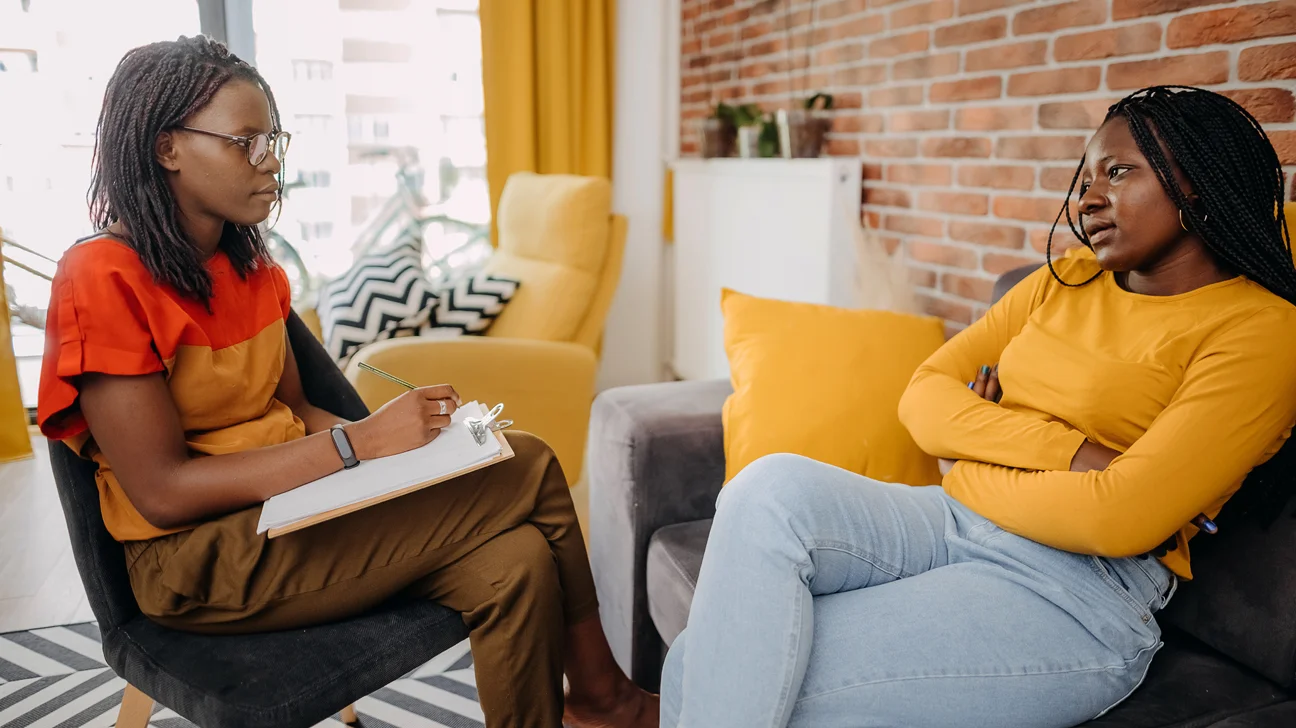If you’re dealing with anxiety, opening up about it can be challenging. Whether you’re seeing an Anxiety Therapist Arlington VA, or somewhere else, talking about your anxiety with a therapist is a crucial step toward feeling better. But the question: “How to Talk to Therapist About Anxiety?” sticks in everyone’s mind. Let’s dive into some practical tips and strategies to help you communicate effectively with your therapist and make significant strides in managing your anxiety.
Be Honest About Your Feelings
One of the most important things you can do is be honest. It might feel uncomfortable to lay all your feelings bare, but remember, your therapist is there to help, not judge. You don’t need to sugarcoat anything. If you’re feeling overwhelmed, afraid, or even skeptical about therapy, let your Anxiety Therapist Arlington VA, know. Your openness will help them understand your situation better and tailor their approach to suit your needs.

Prepare for Your Sessions
Before you head to your therapy appointment, take a few minutes to jot down any thoughts or feelings you’ve been experiencing. This doesn’t have to be a formal document—just a quick list of what’s been bothering you or any significant events that might have impacted your anxiety. This can help you stay focused during your session and ensure you don’t forget to mention important details.
Describe Your Symptoms Clearly
When talking about your anxiety, be as specific as possible. Instead of saying, “I feel anxious,” try to describe what anxiety feels like for you. For example, you might say, “I feel a tightness in my chest and have trouble breathing when I’m in crowded places.” Specific descriptions can help your therapist identify patterns and triggers, leading to more effective treatment strategies.
Discuss Triggers and Patterns
If you notice certain situations or events that trigger your anxiety, share these insights with your therapist. Understanding your triggers is crucial for developing coping strategies. For example, if social gatherings tend to spike your anxiety, let your Anxiety Therapist Arlington VA know. They can work with you on techniques to manage anxiety in those situations, such as breathing exercises or cognitive restructuring.
Talk About Your Goals
What do you hope to achieve from therapy? Are you looking for specific coping strategies, or do you want to understand the root causes of your anxiety? Sharing your goals can help your therapist design a treatment plan that aligns with what you want to accomplish. Whether you’re seeking relief from panic attacks or aiming to improve your overall well-being, discussing your goals can make therapy more focused and effective.
Learn more about “What to Talk About in Therapy for Depression?” on our blog page now!
Be Open to Feedback
Therapy is a two-way street. Just as you’re sharing your thoughts and feelings, be prepared to listen to your therapist’s feedback. They might offer perspectives or suggestions that you haven’t considered. Being open to feedback doesn’t mean you have to agree with everything, but it can provide valuable insights and help you see things from a different angle.
Discuss What’s Working and What’s Not
If you’re trying out new techniques or strategies suggested by your therapist, let them know how they’re working for you. If something isn’t helping or is causing additional stress, it’s important to communicate this. Therapy is a collaborative process, and adjustments may be necessary to find what works best for you. Your therapist can help fine-tune your approach based on your feedback.
Explore Underlying Issues
Sometimes, anxiety is a symptom of deeper issues. If you suspect that there might be underlying factors contributing to your anxiety—such as past trauma, unresolved conflicts, or chronic stress—discuss these with your therapist. Understanding these deeper issues can be key to addressing anxiety more effectively. Your therapist can help you explore and work through these underlying problems, leading to a more comprehensive approach to managing your anxiety.
Be Patient with Yourself
Therapy is a journey, not a quick fix. Progress may be gradual, and that’s perfectly okay. Be patient with yourself and recognize that managing anxiety takes time and effort. Celebrate small victories and milestones, and don’t be discouraged by setbacks. Your Anxiety Therapist Arlington VA is there to support you through every step of this process.
Ask Questions
If you don’t understand something your therapist says or if you’re curious about certain aspects of your treatment, don’t hesitate to ask questions. Whether it’s about a specific technique, a particular aspect of your therapy, or general questions about anxiety, your therapist is there to provide clarity and support. Understanding your treatment better can help you feel more involved and confident in the process.
Practice Self-Care Between Sessions
Therapy isn’t the only tool you have for managing anxiety. Practice self-care and apply the techniques you learn in therapy between sessions. Whether it’s practicing mindfulness, engaging in physical activity, or simply taking time for yourself, integrating these practices into your daily life can enhance the effectiveness of your therapy.
Revisit Your Progress Regularly
Periodically, it’s helpful to revisit and reflect on the progress you’ve made. Discussing your progress with your therapist can help you see how far you’ve come and identify any areas that may need more attention. Regularly reviewing your achievements and challenges can keep you motivated and focused on your therapy goals.
Be Open About Any Medication
If you’re taking medication for anxiety or any other condition, let your therapist know how it’s affecting you. This includes any side effects you might be experiencing or any changes in how the medication is working. Your therapist and your prescribing doctor can work together to ensure that your medication and therapy are aligned for optimal results.

Share Any External Factors
Life outside therapy can impact your anxiety. If there are major life events, changes in your environment, or personal challenges, share these with your therapist. External factors can influence your anxiety levels, and understanding these connections can help in crafting a more effective treatment plan.
Trust the Process
Finally, trust the therapeutic process. It might feel awkward or challenging at times, but remember that therapy is a safe space designed to help you. Trust in the expertise of your Anxiety Therapist Arlington VA and the techniques they use. With time and commitment, therapy can be a powerful tool in managing and overcoming anxiety. By approaching your therapy sessions with honesty, preparation, and openness, you can make the most of your time with your therapist and work towards feeling better. Remember, it’s a partnership, and you’re not alone in this journey. Your Anxiety Therapist Arlington VA is there to support you every step of the way. Ready to take control of your anxiety and start feeling better? Reach out to Elysian Psychological Services today and see how our expert therapists can help you find relief and build a path to a more balanced life. Don’t wait—schedule your consultation and start your journey to wellness now!


